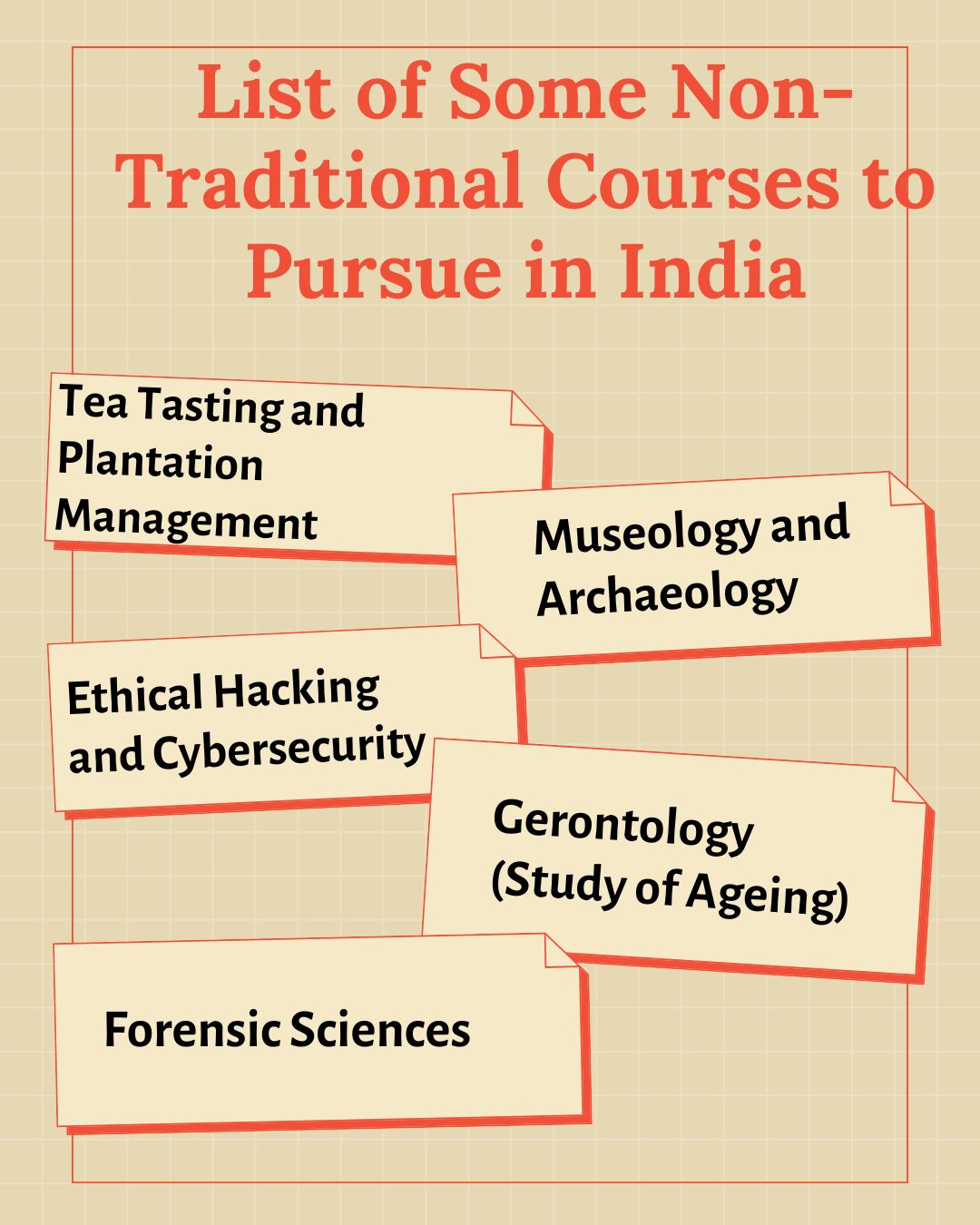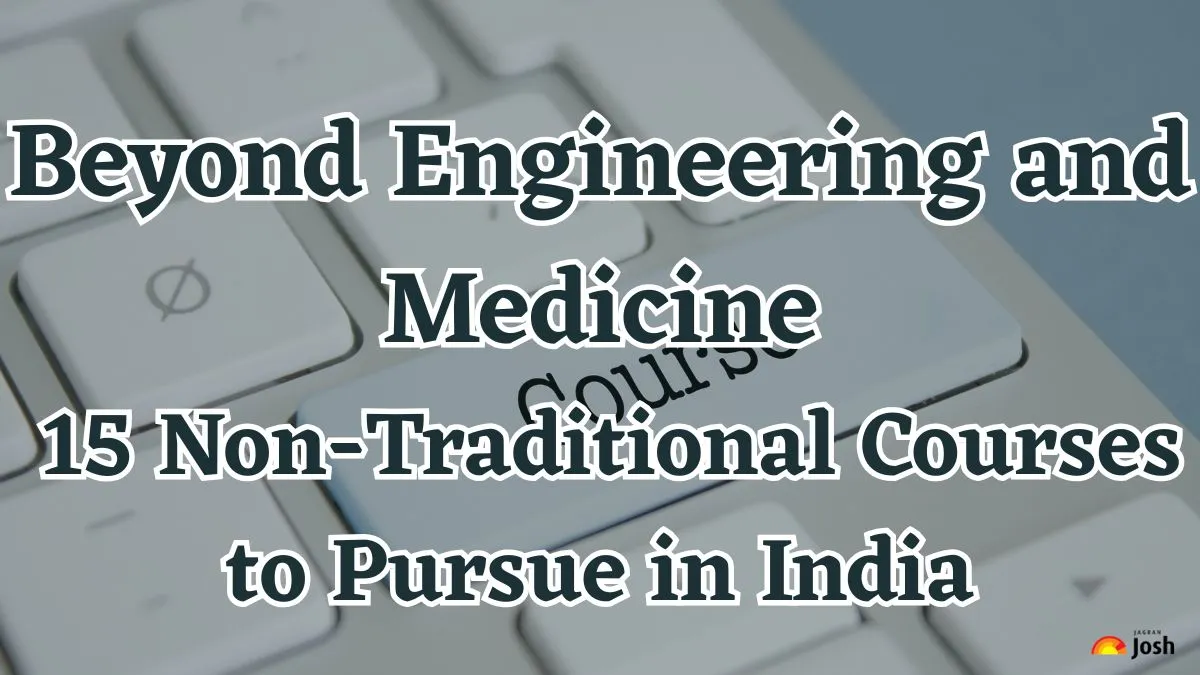In India, traditional courses like Engineering, Law, Medicine, and Management have for a very long time dominated the higher education landscape for students across India. However, as the world evolves and interdisciplinary careers and courses gain popularity, students are increasingly drawn towards non-traditional courses. These non-traditional courses offer the students niche skills, alternative career paths and creative freedom.
These new programs are offered by very few institutes or colleges in India and are less explored. This article will explore the non-traditional courses offered by institutes spread across India, the career opportunities available after graduation and why these courses are worth pursuing. Whether a candidate is passionate about a specific field, exploring these courses could open up unique opportunities.
List of Some Non-Traditional Courses to Pursue in India
In recent years, India’s higher education landscape has expanded beyond the traditional paths of engineering, medicine and management courses, offering students a diverse range of non-traditional courses that blend creativity, innovation and niche skills. These programs cater to emerging career opportunities and industries, unique skill sets, and interdisciplinary learning, helping students to explore passions that were once considered unconventional.
From ethical hacking and food technology to sports management and wildlife photography, such courses not only open doors to exciting career opportunities but also allow students to carve their distinct careers in this competitive world.
Below is the list of some non-traditional courses that a student can pursue in India, along with career opportunities and in which institutes these courses are offered and a little bit about the course itself:-
| Courses | Colleges | Career Opportunities | About |
| Tea Tasting and Plantation Management | Tea Export Consultant | Tea is more than just a beverage; it is both an art and a science. These courses teach students about tea production, tasting techniques, grading, and marketing. Students also study climate science, crop management, and tea tourism. | |
| Plantation Manager | |||
| Birla Institute of Furistic Studies | Agricultural Manager | ||
| Dipras Institute of Professional Studies | Research Roles | ||
| Museology and Archaeology | Banaras Hindu University | Museum Curators | Museology is the study of museums and how they acquire, preserve, interpret, and exhibit artefacts. These courses cover topics like heritage management, exhibition design, and digital curation. |
| Conservation Specialist | |||
| Archivist | |||
| Exhibition Designer | |||
| Institute of Archaeology, Delhi | Museum Educator | ||
| Researcher | |||
| Archaeologists | |||
| Ethical Hacking and Cybersecurity | Indian School of Ethical Hacking, Kolkata | Security Consultant | As data breaches and cybercrime become more prevalent, ethical hacking has emerged as an important talent for safeguarding digital infrastructure. These programs provide instruction in penetration testing, vulnerability assessment, and cybersecurity laws. |
| Institute of Information Security, Mumbai | Cybersecurity Analyst | ||
| Indian Institutes of Technology Campuses | Security Architect | ||
| National Institute of Technology Campuses | Malware Analyst | ||
| Chief Information Security Officer | |||
| Amity University | Network Security Engineer | ||
| Gerontology (Study of Ageing) | Geriatric Care Manager | Gerontology is the scientific study of ageing and the issues that come with it. These curricula are very interdisciplinary, including psychology, healthcare, sociology, and caring. | |
| Tata Institute of Social Sciences | Healthcare Consultant | ||
| Geriatricians | |||
| National Institute of Social Defence (NISD) | Gerontological Social Workers | ||
| Toy Design and Development | Graphic Designer | Toy design is more than just play; it's a tool for education, healing, and culture. Students learn about material design, ergonomics, child psychology, and market research in order to build safe, educational toys. | |
| Indian Institute of Technology Campuses | Game Developer | ||
| Educational Product Designer | |||
| Pearl Academy | Educational Product Designer | ||
| Forensic Sciences | Central Bureau of Investigation | Forensic science blends biology, chemistry, and criminology to determine the truth about criminal cases. India's first dedicated forensic university (GFSU) was established in 2008 and now assists courts throughout the country. | |
| Forensic Analyst | |||
| Intelligence Bureau | |||
| Law Enforcement Agencies | |||
| Forensic Pathologist | |||
| All India Institute Of Medical Sciences (AIIMS) | Forensic Toxicologist | ||
| Public Health Entomology | Indian Council of Medical Research (ICMR) and its Centres | Microbiologist | This course focuses on disease-carrying insects and vectors, applying biology and ecology to public health management. India's malaria control initiatives frequently recruit entomologists to develop tailored interventions. |
| Disease Prevention Researchers | |||
| Researchers | |||
| Entomologist | |||
| Vector Control Research Centre (VCRC), Puducherry | Vector control specialist | ||
| Cartography and Digital Mapping | GIS specialist | Cartography underpins modern geospatial intelligence, including traditional map-making, GPS, and GIS technology.GIS professionals in India can earn a salary of ₹6-10 lakh per year in consultancy firms. | |
| Indian Institutes of Technology (IITs) | Cartographer | ||
| GIS Developer | |||
| Indian Institute of Surveying & Mapping, Hyderabad | Geospatial Statistician | ||
| GIS Analyst | |||
| Geography Teacher |
Choosing a non-traditional course in India may seem a little risky, but it can also lead to rewarding and future-ready career opportunities. As the employment market continues to change, these distinct programs demonstrate that education is more than just conformity; it is also about courage, curiosity and developing your career path.

Also, check:-
To stay updated on current trends, join the Jagran Josh Telegram community!
